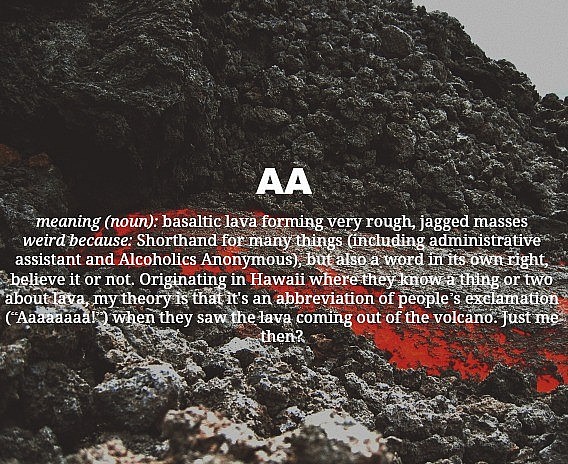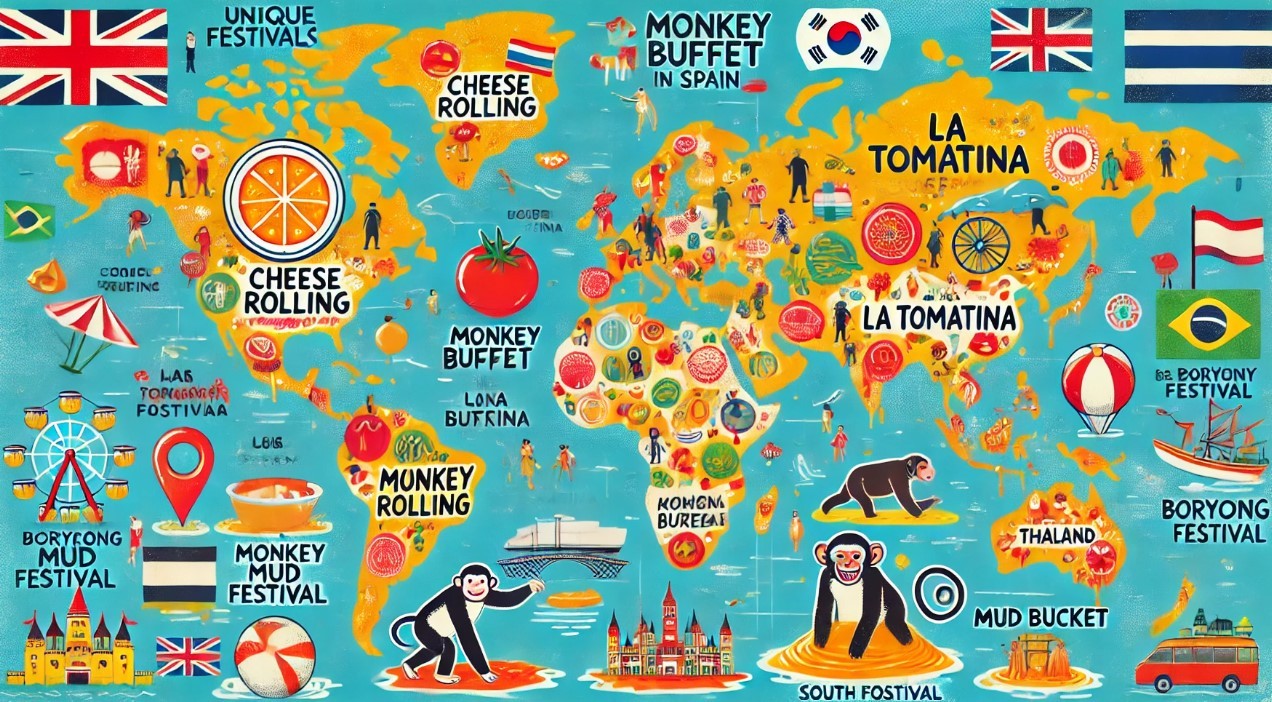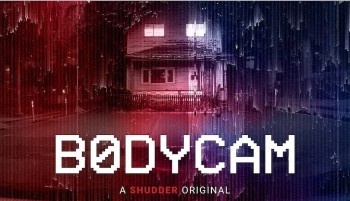Top 30+ Weirdest and Rarest Words In English Language
 |
| Top 30+ Weirdest and Rarest World Words In English Language. Photo KnowInsiders |
| Table of Contents |
Why Learn Weird English Words?
Increasing your vocabulary is always useful—from basic, common vocabulary words to the weirdest ones in the language.
Even native English speakers are constantly learning new words that they never knew existed! You’ll have more brilliant ways that you can describe things and express your ideas. You can impress your friends with your knowledge or even get a great new job by demonstrating your English skills in a big interview.
Just understanding one more word will help you make your way through confusing English conversations. Even if you never use some of these weird words, you won’t be left wondering “what?” if you hear native English speakers use them.
You will also understand a lot more too! This can lead to greater confidence … which then means you speak and practice even more!
Finally, weird English words often have lots of syllables (the different sounds within a word) and unique letter combinations, making them excellent for pronunciation practice.
Say them out loud. Hear the fantastic sounds they make, and you’ll certainly agree that these weird words will add some more life to your sentences and make people stop and listen!
Top 30+ Weirdest and Rarest World Words In English Language
1. Anachronism
Pronunciation: /əˈnæk.rə.nɪ.zəm/
Definition: An anachronism is something (or someone) that is out of place in terms of time or chronology. This is most common with old-fashioned items in a modern setting, but can also occur with futuristic items in period pieces. Most anachronisms are there by mistake, especially within movies and television shows.
E.g. Showing the Pharaoh wearing a wristwatch was an obvious anachronism.
2. Accismus
Pronunciation: /ækˈsɪzməs/
Definition: A form of irony in which someone feigns indifference to something he or she desires. Aesop’s fable The Fox and the Grapes illustrates accismus when the fox dismisses some grapes he is unable to reach, stating that he is sure they are sour anyway.
E.g. “Oh I couldn’t possibly accept…” Exclaimed Veronica upon being presented with a pair of diamond earrings, her natural affinity for accismus shining through.
3. Acnestis
Definition: Space between shoulder blades that cannot be reached to scratch
Pronunciation: ak-NEES-tis
4. Agelast
Definition: A person who never laughs
Pronunciation: AJ-uh-last
E.g. I'm not sure is she's an agelast because she is grumpy or because she's vain.
5. Bailiwick
Definition: a person's area of skill, knowledge, authority, or work (noun)
Pronunciation: /ˈbeɪliwɪk/
E.g.He never writes up our reports—that's my bailiwick.
How to Remember Weird New English Words: Keep a Vocabulary ListOnce you’ve learned all the great new words in our list below, make sure that you actually practice them so that you can make them part of your regular conversations. Some top tips for remembering new vocabulary include the following points: • This doesn’t have to be anything fancy—just a small notebook where you write all new words as you learn them. It helps to have a page for words that start with each letter of the alphabet. • Divide each page into three columns. Write the word in the first column and a short definition (in English) in the second column. You can use the third column for making notes, sample sentences and any additional meaning in your own language. |
6. Bumfuzzle
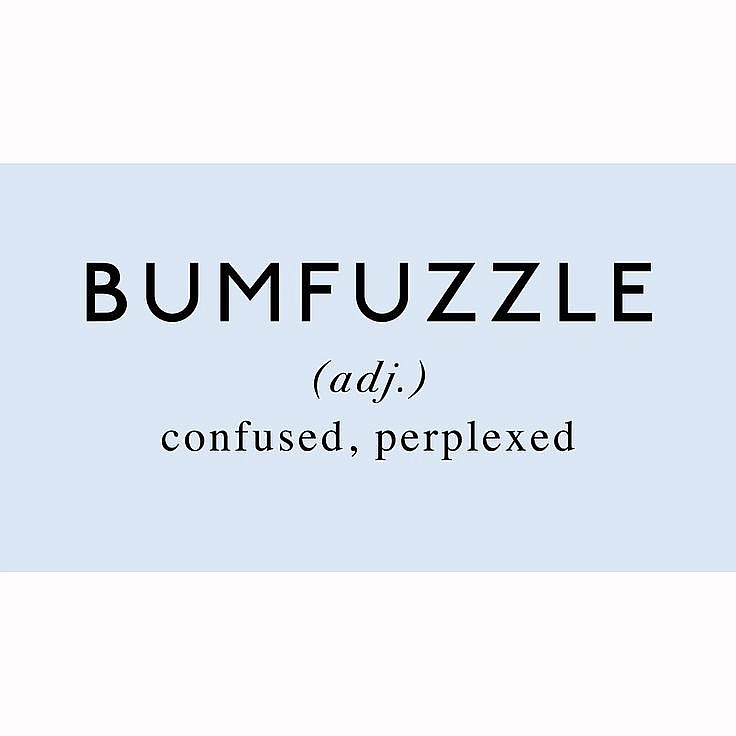 |
| Photo Pinterest |
To bumfuzzle is to confuse or fluster.
Bumfuzzle is most often used in the dialect of the Southern United States. It is colloquial, meaning it is typically used in informal conversation. It is very similar to bamboozle, and may be derived from it.
How to pronounce: /buhm-fuhz-uhl/
E.g. I was totally bumfuzzled by the physics homework last night—I didn’t understand any of it!
7. Behoove
Definition: You can use behoove as a verb that means to be necessary or appropriate for something else. It comes in handy when telling someone why they should do something or when writing a persuasive essay.
Pronunciation: /bɪˈhuv/
Example: "It would behoove the students to learn the vocabulary terms before the test next week."
| Idiom: • it behooves somebody to do something (formal) • it is right or necessary for someone to do something • E.g. It behooves us to study these findings carefully. |
8. Cacophony
Definition: A cacophony is a harsh mixture of sounds. It descends from the Greek word phōnē which means sound or voice, and is joined with the Greek prefix kak-, meaning bad; creating the meaning bad sound. In a similar way, the word symphony (which means a harmonious arrangement of instruments) traces to phōnē and the Greek prefix syn-, which means together.
Pronunciation: /kəˈkɒf.ə.ni/
E.g. I couldn’t hear over the cacophony of alarm bells.
How to Remember Weird New English Words: Use Post-It Notes and CardsIf you find some words very difficult to remember, try to write the word on a post-it note and stick it somewhere where you’ll see it often. The more you read the word the more you’ll remember it. You could also have small cards with new words that you take with you to different places—you can then refresh your memory when sitting on the train or bus, waiting for a friend in a coffee shop on your lunch break… anywhere! |
9. Crapulence
Definition: Sickness caused by excessive eating or drinking
Pronunciation: krăp′yə-ləns
10. Diphthong
Definition: A sound formed by the combination of two vowels in a single syllable, in which the sound begins as one vowel and moves toward another (noun)
Pronunciation: /ˈdɪf.θɒŋ/
E.g.To adopt such an idea would simplify the teaching of the vowels to learners, since you could absorb these so-called diphthongs into the simple system.
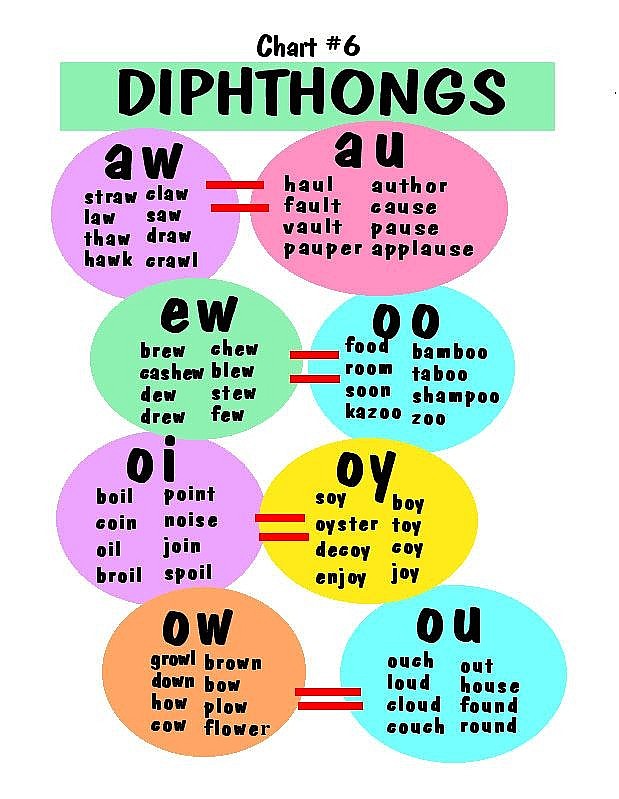 |
| Photo Pinterest |
11. Draconian
An adjective to describe something that is excessively harsh and severe. Derives from Draco, a 7th-century Athenian law scribe under whom small offenses had heavy punishments; prescribing death for almost every offence.
Pronunciation: /drəˈkəʊ.ni.ən/
E.g. The new parking fines are positively draconian.
12. Effete
Sometime, you meet someone or encounter something that is overly refined - even to the point of uselessness. That thing is effete.
Pronunciation: /ɪˈfiːt/
Example: "Her beautifully manicured nails were an effete affectation, getting in the way every time she tried to type."
13. Fatuous
Definition: Sometimes you need to describe someone or something that is foolish or silly. That’s a great time to use the word fatuous.
Pronunciation: /ˈfætʃ.u.əs/
Example: "The clown wore large shoes and a red nose and was generally fatuous."
14. Gargalesthesia
 |
| Photo Pinterest |
Definition: The sensation commonly associated with tickling
Pronunciation: /gar-guhl-es-thee-zee-yah/
15. Gobbledygook
Definition: Close your eyes for a second and think of a turkey. What sound does it make? Does it sound something like “gobble, gobble, gobble”? That’s exactly where this word came from!
Created from the meaningless sound that turkeys make, gobbledygook (noun) was originally an American English word. It was created in the 1940’s to mean words that are nonsense or have no meaning. It also describes when people use too many technical words and so other people can’t understand what they’e saying.
Pronunciation: /ˈɡɒb(ə)ldɪˌɡuːk/
E.g. The Director was talking a load of gobbledygook in that meeting. I have no idea what he wants!”
 Top 10 Best and Greatest Poems In English Language Of All Time Top 10 Best and Greatest Poems In English Language Of All Time |
16. Jentacular
Definition: Of or pertaining to a breakfast taken early in the morning, or immediately upon getting up
Pronunciation: jen-TAK-yuh-luhr
| • J is the beginning of many rare words. • jabberwock means nonsense, gibberish • jabiru means large tropical stork with massive bill • jettatura means the evil eye • jib means small triangular sail extending from the head of the foremast • jibboom means spar forming an extension of the bowsprit • jibe means to change a ship's course to make the boom shift sides • jiboya means boa constrictor • jiffy means unit of time used in computing equal to 1/100 second; any small unit of time • jupon means sleeveless jacket worn beneath a hauberk • jural means of, like or pertaining to the law |
17. Kerfuffle
Pronunciation: /kəˈfʌf(ə)l/
Kerfuffle (noun) has been around since the early 1800s. There are two ideas as to how it came into English. It probably came from either Scottish Gaelic or from Celtic Irish, the languages that were used historically in Scotland and Ireland.
If somebody asked you the following question, would you know what they meant?
“What’s all the shouting for? Why are you making such a kerfuffle?”
It means to make a fuss or a bother, usually when people have different points of view. Imagine two of your friends having a minor disagreement over something and making quite a bit of noise – doesn’t kerfuffle sound like a great way to describe the situation? They might also be making a hullaballoo too…
Weird long word: KakorrhaphiophobiaKakorrhaphiophobia is an abnormal, persistent, irrational fear of failure. In clinical cases, it's debilitating: the fear of even the most subtle failure or defeat is so intense that it restricts a person from doing anything at all. Kakorrhaphiophobia is the most extreme version of what we all experience when we decide to acquire a new skill: doubt, uncertainty, anxiety about our capabilities, and fear of what others will think:
|
18. Hullaballoo (ˌhʌl.ə.bəˈluː)
 |
| Photo behance |
Pronunciation: /ˌhʌl.ə.bəˈluː/
“Did you hear all that hullaballoo in the office today?”
A word that really sounds like what it means, hullaballoo (noun) is the loud noises and shouting that people make when they’re angry.
It’s been part of the English language since the middle of the 18th century.
19. Lionize
Pronunciation: /ˈlaɪ.ə.naɪz/
This awesome positive L word is a verb you can use to talk about celebrities and important historical figures and the way people view them. Lionize means to treat someone as a hero.
Example: "In the North, people began to lionize Abraham Lincoln soon after his assassination."
20. Lalochezia
Definition: Emotional relief gained by using indecent or vulgar language.
Pronunciation: lal’ō-kē’zē-ă
21. Meldrop
Definition: A drop of mucus hanging from the tip of one’s nose
Pronunciation: mell–drawp
Weird short word
|
22. Noisome
Definition: If you need to describe something that is harmful or really annoying to the point of near harm, use the word noisome. It’s also ideal for describing something that smells bad.
Pronunciation: /ˈnɔɪ.səm/
Example: "The cooler of fish, forgotten in the trunk of the car, began to emit a noisome odor after a few days."
 Top 25 Trickiest Eggcorns In The English Language Top 25 Trickiest Eggcorns In The English Language Do you know sometimes a word that sounds like the right word and feels like the right word isn't actually the right word. It is ... |
23. Obfuscate
Definition: Have you ever seen someone make something more confusing than it needs to be? That person is obfuscating a concept.
Pronunciation: /ˈɒb.fʌs.keɪt/
Example: "While making bread is really a very simple process, his explanation of the different types of yeast and flour served to obfuscate the concept."
24. Nikehedonia
Definition: The pleasure or excitement that comes from anticipating success
Pronunciation: nai-kee-huh-daa-nee-uh
25. Nudiustertian
Definition: Of or relating to the day before yesterday
Pronunciation: noo-dee-uhs-TUR-shuhn
E.g.“I’d placed the order that nudiustertian morning”
26. Pareidolia
Pronunciation: /ˌpær.ɪˈdəʊl.jə/
Definition: A psychological phenomenon in which the mind perceives a specific image or pattern where it does not actually exist, such as seeing a face in the clouds. Pareidolia can be used to explain a host of otherwise unexplained sightings.
E.g. Alex was sure he saw a human face on the moon’s surface, but it was more likely to be pareidolia.
27. Riposte
Pronunciation: /rɪˈpɒst/
Definition: A quick or witty retaliatory reply. In the context of the sport of fencing, a riposte means a counterattack that is made after successfully fending off one’s opponent.
E.g. Cora was known for having an excellent riposte to any insult.
28. Obelus
Definition: The name for the division symbol ÷
Pronunciation: aa-buh-luhs
29. Verisimilitude
Definition: Something that merely seems to be true or real. Many writers or filmmakers try for some kind of verisimilitude in their stories, to make them believable. Including a great many details in a novel, for example, adds to its verisimilitude.
Pronunciation: /ˌver.ɪ.sɪˈmɪl.ɪ.tʃuːd/
E.g. She was experiencing a nightmare of the most extraordinary verisimilitude.
30. Zeugma
Definition: A figure of speech in which one word has a double meaning within a sentence, zeugma is a useful term for language arts papers. An example of this would be, “He stole my heart and my car.”
Pronunciation: /ˈzjuːɡ.mə/
Example: "In a statement of zeugma, she said she liked her men like she liked her tea: sweet, strong, and fragrant."
Conclusion
How to use these rare words correctly? First you should understand their meaning.
If you’ve ever seen someone misusing words, you know how that kind of mistake can reflect negatively on perceptions of intelligence. Take a few moments to quiz yourself on the meaning of these uncommon words so you can break them out in your next essay or speech.
 The Most Popular Passwords and The Worst Passwords The Most Popular Passwords and The Worst Passwords Surprising, many people seriously still using 123456, abcd1234... as a password for their online accounts. If your password is on this list, you should change ... |
 Most Expensive Google Keywords 2022 to Increase Adsense Earnings Most Expensive Google Keywords 2022 to Increase Adsense Earnings We try to find ouf and predict the most expensive Google keywords in 2022 and the coming years - High CPC Adsense Keywords - that ... |
 Learn These 2 Words, Your Life Will Change Automatically Learn These 2 Words, Your Life Will Change Automatically In this life, there are no insurmountable obstacles, after the rain there will be a rainbow. A truly wise person is one who knows how ... |


